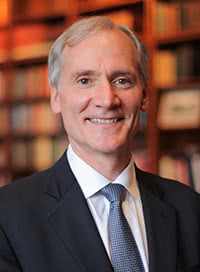Rockefeller University president Tessier-Lavigne chosen to lead Stanford University
Marc Tessier-Lavigne, Ph.D., will step down from his position as president of The Rockefeller University September 1, 2016, to become the 11th president of Stanford University, it was announced today.
Tessier-Lavigne was elected 10th president of Rockefeller in September 2010 following an international search, and began in March 2011. A world leader in the study of brain development, he served on the faculties of the University of California, San Francisco and Stanford University and was executive vice president and chief scientific officer of biotechnology pioneer Genentech.
 During Tessier-Lavigne’s tenure, Rockefeller built on its legacy of exceptional leadership and transformative science, ranking among the top institutions globally for scientific impact and graduate education. Today, the university is flourishing, with an esteemed and highly honored faculty, bold initiatives in basic and clinical science, record-setting fundraising, strong partnerships with New York City’s life sciences community, and a state-of-the-art campus extension underway.
During Tessier-Lavigne’s tenure, Rockefeller built on its legacy of exceptional leadership and transformative science, ranking among the top institutions globally for scientific impact and graduate education. Today, the university is flourishing, with an esteemed and highly honored faculty, bold initiatives in basic and clinical science, record-setting fundraising, strong partnerships with New York City’s life sciences community, and a state-of-the-art campus extension underway.
Rockefeller Board of Trustees Chairperson Russell L. Carson issued the following statement to the Rockefeller community:
“By now you have heard that Marc Tessier-Lavigne will be leaving Rockefeller University later this year to become the next president of Stanford University. While the Board of Trustees and I are very sorry that he will be leaving us, we also recognize the extraordinary opportunity that Stanford presents for Marc and wish him well in his new role. During his five years at Rockefeller, Marc has made numerous contributions to the University, including continuing to recruit outstanding faculty members, enhancing an already competitive graduate program, developing the current strategic plan for both scientific programs and facilities, guiding the university most of the way through a very ambitious capital campaign, and increasing the profile of Rockefeller throughout the New York community and beyond.
“Marc will remain fully engaged in the day-to-day management of the University through the summer. The Board of Trustees has asked me to form and chair a search committee to immediately begin the process of recruiting the next president of Rockefeller.
“The University is fortunate to be in a very strong position, with a distinguished faculty, a balanced budget and robust endowment, a new River Campus already in progress, and a fund-raising campaign running well ahead of schedule. We have tremendous momentum, which should enable us to recruit a highly qualified candidate to be the next leader of this remarkable institution.”
The Rockefeller University is the world’s leading biomedical research university and is dedicated to conducting innovative, high-quality research to improve the understanding of life for the benefit of humanity. Our 79 laboratories conduct research in neuroscience, immunology, biochemistry, genomics, and many other areas, and a community of 1,800 faculty, students, postdocs, technicians, clinicians, and administrative personnel work on our 14-acre Manhattan campus. Our unique approach to science has led to some of the world’s most revolutionary and transformative contributions to biology and medicine. During Rockefeller’s 115-year history, 24 of our scientists have won Nobel Prizes, 21 have won Albert Lasker Medical Research Awards, and 20 have garnered the National Medal of Science, the highest science award given by the United States.


